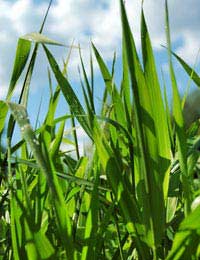How Can Hypoallergenic Grass Help Hayfever Sufferers

For hay fever sufferers, the lush grass that surrounds them can look anything but inviting. Instead, these allergenic grasses can seem like a warm weather enemy as they trigger painful hay fever symptoms from what should be enjoyable, sunny days outside. For many hay fever sufferers, they have tried numerous over-the-counter or prescription treatments that have not been successful and they are constantly waiting for new, more effective treatments to emerge. One potential 'treatment' that has shown promise is hypoallergenic grass.
Modifying Grass to Reduce Allergies
A new type of grass seed has been genetically modified to omit two of the common hay fever allergens. The aim is twofold: to improve the public's perception regarding genetically modified products and to dramatically improve hay fever symptoms for sufferers. In the United States, a common trigger of hay fever symptoms is ragweed. In Europe, however, ryegrass is a key culprit.The hypoallergenic grasses are genetically modified perennial and Italian ryegrasses. Ryegrass is very allergenic, mostly due to the pollen proteins and broad distribution. People susceptible to allergies from ryegrass also tend to be allergic to other forms of grass as well. With genetic modification, scientists have not exactly turned off the expression of the genes fully, which means there is still some level of allergens. At present, they have managed to successfully reduce pollen proteins by fifty percent. There is, however, the chance to completely remove the offending allergen, which means turning off the offending genes.
Unfortunately, it will still be many years before these hypoallergenic grasses are available to the market. Field trials are still ongoing and there are various issues to resolve before hypoallergenic grass becomes a practical reality for hay fever sufferers. Still, there is hope that even a fifty percent reduction can make a major difference in symptoms. In particular, a complete removal of the allergenic genes would be exciting news for hay fever sufferers - more so if the grass is widely used to allow for less hay fever discomfort.


Re: Common Symptoms Of Hay Fever
Few months ago I had anelegic reaction in under my eyes so I was prescribed steroids antihistamine they worked. Then few weeks…
Re: Rebound Nasal Congestion
I recently had a rhynectomy for sac since the operation I have been suffering from a severe blocked nose any body offer any advice
Re: Tree Pollen
Tender lymph glands in your neck under your chin are a sure sign of the body reacting to tree pollen. My glands have been tender since January but,…
Re: Tree Pollen
Does anyone know if Hawthorn causes hayfever please? We have a lot of Hawthorn at the bottom of our garden and I'm really suffering at the moment with…
Re: Tree Pollen
Having not really suffered from any Hayfever symptoms since 1988, I can honestly say that I have never felt so rough as I have these last 6-7 weeks. So…
Re: Tree Pollen
Do conifer trees cause big hayfever allergies? Massive conifer in our front garden which we have watched spewing out pollen for weeks, coating cars. I…
Re: Tree Pollen
I developed tree pollen allergy about fifteen years ago in my mid thirties. I had desensitisation injections for 3 years at Southmead hospital in my…
Re: Tree Pollen
I have been suffering from seasonal tree pollen hayfever for the past few years and in response to Katy, the timing of your discomfort is probably…
Re: Tree Pollen
First year I have experienced hay fever.started feeling rough in March sore throat and uvlia, had a large rash on upper torso.blocked nose in morning
Re: Tree Pollen
My hay fever is the worst it has ever been and I have been unable to go outside for over a week now or open a window. Just to get out of bed in the…